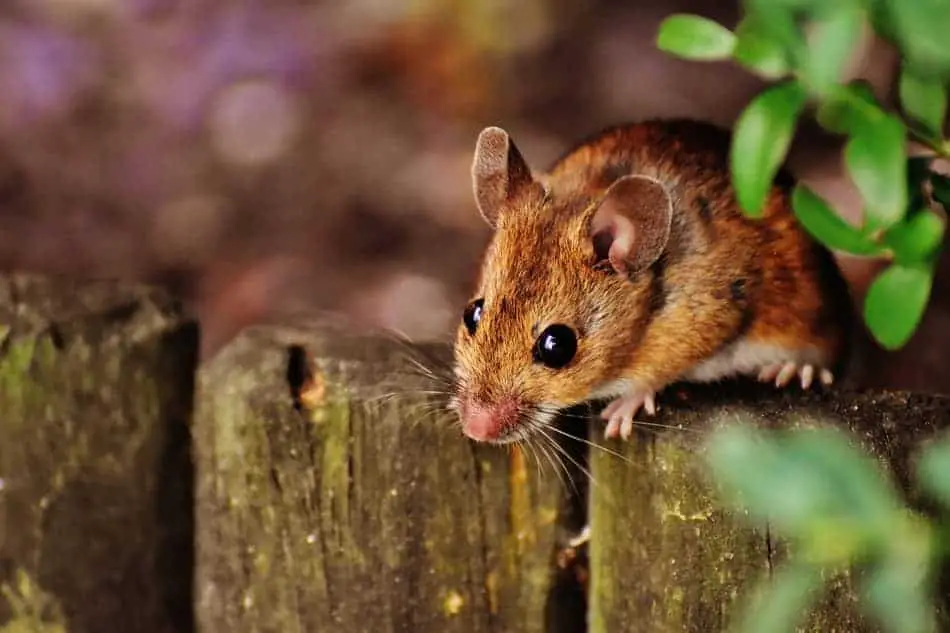
Early last summer my old neighbor had a problem – he had mouse droppings in and around his gas grill. That grossed me out, and we never spoke of it again – but it did get me wondering – how do you keep mice out of your barbecue? So I did some research.
So how do you keep mice out of the BBQ? There are basically three options: Remove the food source such as the grease drippings, put in a deterrent such as a scent or a poison, or create a physical barrier such as wood or wire.
Rodents in your barbecue are a significant health and safety concern, and are really pretty gross. Keeping mice out of your BBQ can be a fairly difficult and involved process.
Looking for outdoor mouse traps? Check out the selection at Amazon
Rodents Love Your Gas Grill
Your gas grill has everything a poor rodent would ever want in a winter home. Protected from the wind and weather by the grill body (and the cover, if you’re covering it – see here for my opinion on that one), full of yummy grease and burned food bits, and safe from predators who can’t squeeze in the tiny holes that mice can make their way through. The problem with mice in the BBQ, other than being really gross, is that they will leave their droppings and urine all over the place including cooking surfaces. Rodent feces and urine can be dangerous and can carry multiple diseases that are harmful to humans.
Rodent infestations can take multiple forms, from simply passing by to munch on crumbs and grease, to moving in to stay. The type of action you need to take in order to keep the mice out of your grill for good depend on what kind of infestation you’re dealing with.
Let’s consider a couple of example cases:
Case 1 – you step outside after a long cold winter to grill for the first time and find mouse droppings (if you need to know how to spot mouse droppings, Terminix has a good infographic about it here.) Examining the barbecue top to bottom you breathe a sigh of relief that there is no nest, and no permanent guests. When this happens you need to thoroughly clean your BBQ to reduce the spread of any harmful diseases (see below, remember the gloves and mask), and then get to cooking.
Case 2 – again you step outside after a long winter to grill for the first time, and when you pop open the grill, Mama Mouse comes charging out with a load of babies clinging to her. You look in the grillbox and see a large nest and a bunch of mouse poop. This is going to require some heavy duty disposal. They are going to want to come back. If you don’t drag your grill to the curb immediately and go shopping for a new one, you’re going to have to employ multiple techniques to keep the mice away for good. Start with disposal of the nest and a thorough cleaning (again, gloves and mask people!), and then go on to step 2: the remedies.
Remedy #1: Removing the Food Source
Removing the food source from the grill is going to be the most challenging and most time intensive remedy, which is why we’re starting there. Depending on the setup of your grill, it may be difficult to get to the drip pan, and who really wants to spend all that time cleaning your grill after each use? You do, that’s who, if you have a mouse problem you need to get rid of.
So to employ Remedy #1, after each use:
- Use your grill scraper to clear off any residue from the grills
- Run your BBQ for 10-30 minutes at a high heat to fully char any remaining food residue
- After your grill cools, wipe down the grills and heat spreaders, and scrape out anything that’s fallen into the grillbox.
- Remove and clean the drip pan. You can consider a disposable drip pan for this situation – then it can just get tossed.
If you’re not quite willing to go that far, you should run your BBQ for 10-30 minutes after grilling, and regularly empty the drip pan. You can also increase the frequency and seasonality of your grilling – If you use your grill a little more often throughout the year you will likely reduce the chance for mice to get in and make a home.
In addition to just cleaning the grill, look at everything else in your yard. If you have another source of food for mice they are going to be very hard to get rid of. Consider getting rid of bird feeders, fruit plants/trees/bushes, and make sure your garbage is secure if you keep it in the back yard.
Remedy #2: Deterrents
Deterrents are anything that might make a mouse decide that the barbecue really isn’t a great place to hang their hats. This could be a scent, a poison, traps, a hunter – anything that will keep the mice away. Looking through multiple ideas out there on the interwebs, I’ve found the following suggestions that range from the obvious to the… interesting. YMMV on each one, links are to Amazon.
- Traps – used to catch or kill mice, traps may work in your environment. If you live in a rural area or back on to a wooded/wild area you may not be able to significantly reduce the population by trapping. Traps can include:
- Live mouse traps – if you’re not into eliminating the mice, you can use these to catch and release. Make sure that you check them often so that you’re not scraping desiccated starved mouse out of them including their feces and urine.
- Mouse snap traps. Your everyday mouse traps.
- Mouse glue traps – I personally don’t like these. Glue traps basically grab a mouse and make them thrash around until they starve themselves to death. Not a pretty sight. Better a quick death with a snap trap.
- Scents – to make it uncomfortable for the mice to be in your BBQ, these are placed in the grill box while not in use, or under the grill if your BBQ is also enclosed. These can include:
- Commercial mouse repellent – this can be purchased online or through your local hardware store.
- Cloves – they reportedly hate these. You do need enough for the scent to get through the entire BBQ.
- Mothballs – an older remedy, but they will stink up your BBQ – and they are toxic gas. Maybe not the best way for your BBQ.
- Camphor – a waxy flammable substance that can be made a few ways – be careful with the flammables.
- Cat fur – if you don’t have a cat, consider asking a friend for some after their cat gets their next brushing.
- 100% Oil of Peppermint – for this one, thing GNC, not the grocery store.
- Poison – poison may or may not be viable in your location – depending on the environment, other animals, kids, etc… You will want to be very careful when using poison to reduce your rodent infestation.
- Visit your local hardware store or contact an exterminator to discuss mouse or rat poison
- Ultrasonic pest control – jury is out as to if this really works. Some swear by it, some think it’s bunk. Little devices that plug in and emit an ultrasonic frequency that is irritating to mice but outside a human’s range of hearing. If you’re putting it outside, make sure it’s rated for the outdoors.
Remedy #3: Physical Barriers
Physical barriers are anything that makes your BBQ harder to access for furry intruders. These can be both physical blocks to getting into the BBQ or changes in location or properties to make it more difficult to access. These can include:
- Using chicken wire, copper mesh, steel wool, or other wires or meshes to close up the holes in your BBQ. If your problem is over winter, you could winterize the barbecue with items that need to be removed come grilling season, but if you plan to protect your barbecue all year round make sure you don’t impede ventilation or use anything flammable.
- Wood barriers for any parts of the grill that don’t heat up – in the closed compartment below the grill to block off any major holes
- Move your BBQ a little farther from the house/fence. You’d be surprised how many people see mice climb their fence or house and then leap onto the barbecue. Moving it a little farther away from your house or fence could make it difficult for a mouse to make the climb.
- Place your grill in a shed/garage/house after use. Make sure it’s fully off and fully aired out, and if it’s going inside you likely want to make sure it’s very clean first. This may not be practical for a lot of people and mice will often also infest sheds and garages.
- Replace your BBQ cover. While I’m not a cover fan, if you use one there are lots of reports about mice climbing the inside of a felt or fabric lined BBQ cover. Consider switching to one that doesn’t have a fabric lining, or go all the way with a zippered BBQ cover.
Or All Three
If you only have one incident of a rodent invasion of your grill, you may not need to worry about all the methods and preventatives that we’ve gone through – just make sure it’s had a thorough cleaning and burn-off, and you many not have an issue. However, if you’re fighting a constant running battle with the little critters, you may have to keep trying everything above until you finally come out victorious – or drag your grill to the side of the road and wave the white flag. Good luck in your contest of man/woman vs mouse!
Related Questions
Other than health concerns, why are mice bad for BBQs? The biggest physical danger for mice in your gas grill is the chance that they will chew and damage the gas/propane line coming into the grill. If you start to smell gas or hear that slight hissing, turn off the fuel at the source and get it looked at immediately.
What about other animals in the BBQ? Rodents and Pests (earwigs, wasps, and ants) are typically the bad guys when it comes to despoiling your stainless steel palace but you can find other animals in there. If it’s something helpful like bees, contact an apiary to get them safely removed. It it’s an animal you don’t think you can handle, contact your local animal control.
How do I clean my BBQ after a rodent invasion? Follow these steps to improve the safety of your grill post-infestation:
- Remember to wear latex or rubber gloves and use a mask or ventilator – you definitely don’t want to breathe those droppings in.
- Pull out the grease trap and fully clean it with soap and water and disinfectant. Rinse thoroughly and let dry.
- Remove the grills from the grillbox and clean with hot soapy water and a wire brush. Get the entire surface of the grill clean. Use a disinfectant to wipe down the grills again. Rinse thoroughly then set the grills aside and allow to dry. Follow the same steps with any heat spreaders.
- Use soapy water to clean the inside of your firebox and all the open surfaces of your barbecue. Wipe down with disinfectant. Wipe down/rinse with clean water as appropriate. Allow to dry.
- Replace all grill components and light the barbecue. Turn the BBQ up to the highest acceptable sustained heat (based on your manual) and let it run for 30 minutes to an hour .

